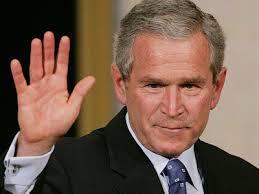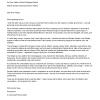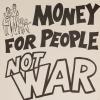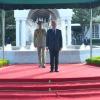Dear President Bush:
This Fall, my theater company will have the honor of producing a festival of the complete plays of Václav Havel, the man who, as you know, was recently President of the Czech Republic. He is a man I think we both admire. I don’t know if you are familiar with his writing, but I am sure you are familiar with his struggles during the Communist era in Czechoslovakia. He was jailed for being a bold advocate for freedom in a country where, for many years, it was sadly lacking. His writings articulate the principle of living in truth: that freedom can best be achieved when the seemingly powerless in society live true to their beliefs.
Soon after what is known as the Prague Winter, when Soviet troops clamped down on burgeoning freedoms and their tanks rode into Prague to enforce Soviet rule, Havel wrote a series of letters to the leaders of his country. The first was a private letter to Alexander Dubcek, the leader before the Soviet invasion, and the second was an open letter to Dr. Gustav Husák, the general secretary of the Czechoslovak Communist party. Havel felt it imperative to speak what he believed when his country which he loved was moving so strongly in a direction away from human rights and civil liberties.
I find Havel’s example inspiring. As one person in a vast country it is easy to feel powerless, and any attempt to effect change appears to be a drop of water that disappears into the roaring torrent of a seemingly unstoppable river. But I think it is important to make an attempt, and I think that the example of many of the former Communist countries has shown that enough drops of water can, over the years, actually change the course of that river.
Our country has never reached the excesses of Communist Czechoslovakia. The Bill of Rights guards against the all too human tendency to discard human and civil rights for security and power. But the Bill of Rights is not a magical force, and what we have created we can also destroy. I know you find your faith and morals to be a guiding and sustaining force in your life, and I’m sure you have learned that the things that sustain us must not be taken for granted. In fact, our moral center may sometimes be the hardest thing to maintain—it takes vigilance, and it takes self-examination. This is why, as Americans, it is essential that we examine ourselves in a clear, critical light.
Mr. President, when I employ this self-examination, I find myself dismayed. I find that we have recently been too quick to discard the basic freedoms upon which this country was built and for which we have, for so many years, received the admiration of the world. During the Communist era, Havel often looked to us as an example. I know his visit to New York City right before the Prague Winter was inspiring to him. Many others in oppressed nations have seen our democracy as a beacon of light. But recently, I fear, those principles which so inspired Havel have been degraded and, to an extent, discarded.
We are not a totalitarian country, or even a post-totalitarian country (as Havel called his own government during the Communist years), but we have begun installing mechanisms of totalitarianism. Once those mechanisms are in place it becomes far too easy, I fear, to take the next step.
What are those mechanisms? The first, I would say, is the loss of the respect for human rights and dignity. I refer in particular to our prisoners of war, whom we have chosen to label “enemy combatants” in order to rob them of civil liberties, and who have been tortured by us, both inadvertently and deliberately. I speak also of a bureaucratic (not a judicial) system, which first presumes prisoners linked to terrorism to be guilty until proven innocent and then denies them the opportunity to prove themselves innocent. I am relieved that you recently relented slightly on your positions regarding the prisoners at Guantanamo and whether torture can be allowed. Nonetheless, your signing statements indicate that whatever Congress decides, very little will be changed. The rule of law is one of the first things to fall in a totalitarian state. Ignoring legislation passed by Congress and implementing what you feel should be the law makes your law the only law, and that is a hallmark of totalitarianism.
By discarding the Geneva Conventions for “enemy combatants,” we ignore the rule of law again. In his country, Havel was imprisoned on trumped up charges that were mere excuses for harassment. Some of his friends died while under intense interrogation. Yet even they did not endure the extremes that we, under our current policy, allow our prisoners to be put through. Havel’s experiences, difficult as they were, pale in comparison to, for example, the process of waterboarding, which we officially allow as an interrogation method.
When we abuse the rights of our prisoners more than those we have formerly condemned, something terribly wrong has happened to the moral compass of our country. And yet we do have some limits which keep us beyond the practices of a country like, for example, Syria. There are some things we will not do—personally. Instead we use of the practice of “extraordinary rendition.” Sending those we presume to be guilty to a country where we know they will be tortured is no different than torturing those people ourselves. Even if those we label as “enemy combatants” are in fact enemies (since there is no trial, or even charges, there is no way to know), the use of torture, whether directly or by proxy, betrays every ideal that we hold as a country.
Any country that endorses the use of secret detentions, long term imprisonment without trial, and torture has taken a large and dangerous step towards totalitarianism. These actions have not been decided upon democratically. They have been taken by a few in secret. And though you may honestly believe that these people are our enemies, it is easy for the definition of enemy to expand. It is a small step to take from justifying your actions against an enemy in war to justifying those same actions against a political enemy History has seen that step taken again and again. When the mechanisms to secretly imprison and torture another are in place, there will eventually and inevitably be someone who comes along who does not care what the original definition of enemy was supposed to be.
How would this hypothetical person find his or her political enemies? It would not be hard because another mechanism of totalitarianism is now in place: the use of wiretapping without judicial review. Once again, I do not accuse you or anyone in your administration of pursuing wiretapping without a warrant for that purpose. I believe that you see wiretapping as a way to combat terrorists. But when you remove the element of judicial review, you made it possible for the practice to be abused. It only takes one unscrupulous man or woman to abuse it.
We need only to look at Czechoslovakia to see how such abuse can develop. During the Communist years, Havel’s residencies were wiretapped, bugged, put under constant physical and video surveillance, and occasionally searched. All this took tremendous time and energy and led to absolutely nothing besides huge expenditures and general misery. Why did it happen? The government confused the safety of society with the safety of those in power, a safety threatened by a man who simply spoke and wrote what he believed.
Perhaps, now that wiretapping is more in the public eye, such an abuse will be deterred. We are fortunate that the press has, for the most part, done its job as a “watchdog” of democracy. Yes even here, our free press, perhaps the most important deterrent to totalitarianism, has been threatened. The New York Times and other news media have received the ire of the administration and others for supposedly putting our security in jeopardy by revealing programs the government wanted kept secret. There has been talk of putting journalists in jail. There has been an attempt to create an atmosphere of fear in order to limit investigative reporting.
Fortunately, our press has resisted. If you look at the “approved” news in Communist Czechoslovakia or in any current totalitarian country you see how the suppression of information makes freedom sicken and die. Many in our press still fight against that sickening and for our American ideals.
But there is much that is still unknown, and the use of secrecy based on security is a classic step towards totalitarianism. Who would not prefer to keep every mistake and transgression private? And who is without mistakes or transgressions?
I know what I am saying may be easily dismissed by those on your staff who receive my letter. After all, I expect that you receive many letters critiquing your policies; constant voices from across the country asking to be heard, and I know it would be impossible to listen to them all. And it is never pleasant to hear criticism.
I also know that when Havel sent his letters he had little hope they would be read by the persons to whom he wrote. For years they had no effect at all. But then, all at once, everything he said seemed to be heard. Of course, this was only the perception. In reality, it was the accumulation of not only Havel’s voice but also the voices of his countrymen, those people who for over twenty years were able to “live in truth” under circumstances much more difficult than I or most of those I know are facing here in America.
Yet I fear greatly. I fear that America is weakening. We are not weakening because of the attacks that come at us from the outside, but because of what is happening to us on the inside. I fear we are losing our soul. It is as if, to avoid a suicide bomber, we are committing suicide ourselves.
But if I have learned anything from Havel’s writings and personal example it is hope. Even when in prison, even in the darkest of circumstances, Havel had the hope that living in the truth could change his country. I have the hope that we can regain what has been eroded. We still have words like freedom, justice, and liberty: we must now remember what they mean. When we say freedom we must mean true freedom and not use it merely a slogan that endorses everything including the lack of freedom. Justice must mean true justice, not be a rationalization for the abuse of justice in order to legitimize torture. And liberty must include the preservation of our basic civic liberties and a respect for the liberty of all persons, and not be a perverse justification for the use of force upon others. If we cannot live these qualities, these truths, at home it is hypocritical to promote them abroad.
To conclude, I would like to quote the final paragraph in Havel’s letter to Dr. Husák:
“As a citizen of this country, I hereby request, openly and publicly, that you and the leading representatives of the present regime consider seriously the matters to which I have tried to draw your attention, that you assess in their light the degree of your historic responsibility, and act accordingly.”
Respectfully yours,
Edward Einhorn
Artistic Director, Untitled Theater Company #61
















